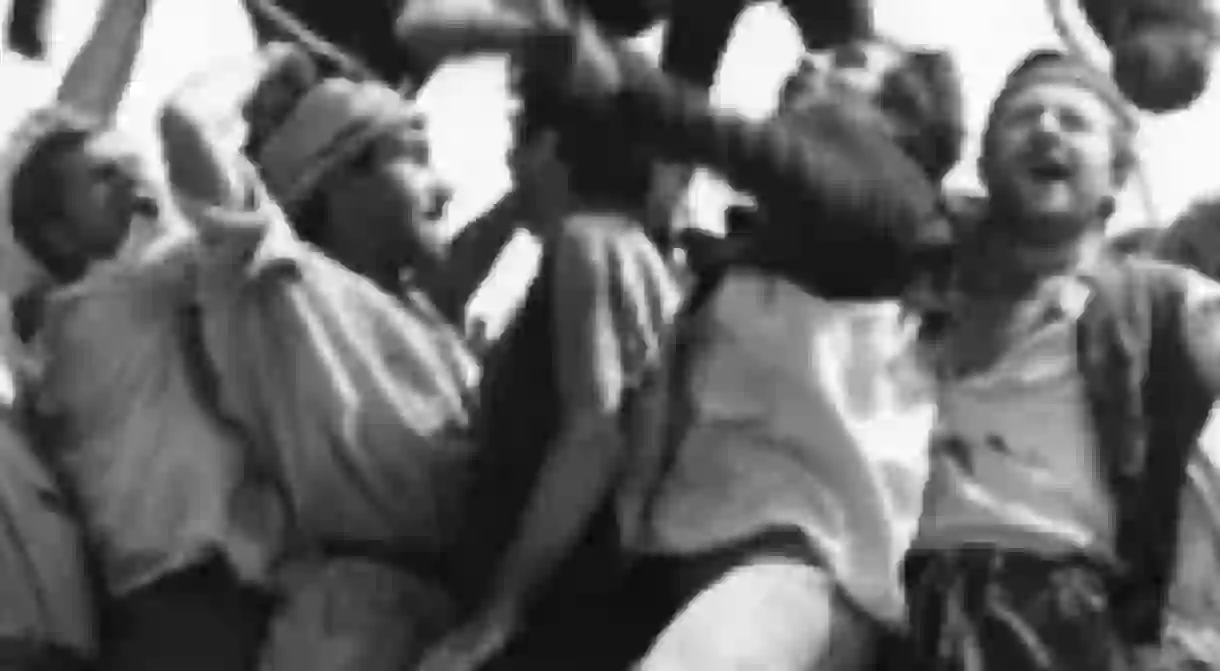Chronicling Repression: Bulgarian Cinema under Communist Rule

From enforced nationalisation after WWII, to decades of censorship and propaganda before the fall of the Berlin wall, Bulgaria’s film industry has been under authoritative duress for most of its life. Despite these difficult conditions, creativity still flourished within the circumscribed limits of Communist censorship, as these five films reveal.
The Tied up Balloon (1967) directed by Binka Zhelyazkova’s
The Tied up Balloon was one of the most innovative and challenging works by Bulgaria’s pioneering female director, Binka Zhelyazkova. Set during WWII, a barrage balloon inexplicably appears in the sky above a remote peasant village creating an atmosphere of alarm, speculation and debate. One of four of Zhelyazkova’s banned works, the film was seized almost immediately after its premiere for containing content deemed offensive and insulting to the ruling Communists. Zhelyazkova was a feminist and political activist who always sought to explore contemporary issues, using cinema as the loudspeaker, and The Tied up Balloon was no exception. It was only after the restoration of democracy in 1990 that the film was able to resurface and it is now recognised as a masterpiece of its time from one of Bulgaria’s unsung artistic heroes.
The Goat Horn (1972) directed by Metodi Andonov
The Goat Horn is set in 17th century Bulgaria, when the country was under the semi feudal rule of the Ottoman Empire. When peasant farmer Karaivan’s (Anton Gorchev) wife is raped and murdered by oppressive local land barons, he conceals his daughter Maria (Katya Paskaleva) from harm by disguising her as a boy and trains her in the art of assassination to exact their revenge. Shot entirely in black and white with sparse dialogue, director Metodi Andonov relies upon frugal yet powerful imagery and naturalistic acting to achieve poignancy. Many have compared his style with the Italian Neo-Realism of the time and The Goat Horn is one of a number of films that thrived during one of the industry’s most frenetic periods. Unlike other parallel state films that purely provoked propaganda, The Goat Horn was one of those existential works encouraged by the Communist regime to showcase the country’s artistic depth and rich culture.
A Nameless Band (1982) directed by Lyudmil Kirkov
A Nameless Band revolves around a group of five young friends who haphazardly form a band. In order to achieve success, fame and money, the group set off on a tour of charmless seaside resorts and humble beach front beer bars. Power struggles, creative control and compromises soon create upheaval which leads the band pondering over what’s really important to them. Revered director Lyudmil Kirkov’s quaint comedy is far removed from what Western audiences might consider conventional. There is no doubt that the film is a quintessential piece of 1980s Bulgarian cinema but Kirkov’s superb construction of narrative and Stanislav Stratiev’s nuanced characters and universal themes mean the film transcends generational gaps. Made seven years before the fall of the Communist regime, the film also acts as a distinctive portrait of the time.
Time of Violence (1988) directed by Ludmil Staikov
Based on the novel Time of Parting by historical journalist Anton Donchev, Time of Violence is another cultural vignette focusing on the country’s fraught and torrid past. Set in the 17th century, the film highlights the subjugation of Christian Bulgarians and their forced conversion to Islam at the hands of the ruling Ottoman empire. While instances of extreme cruelty portrayed in the film undoubtedly happened, the film should not be viewed without an understanding of the domestic Turkish-Bulgarian relations of the time. To consolidate their power during the 1980s the ruling Communist Party sought to bolster national pride by championing Bulgarian heritage. Bulgaria’s Turkish minority however didn’t fit into that equation and the resulting prejudice and assimilation campaigns saw nearly 300,000 people immigrate to Turkey. The film is generally grounded in fact and truth but unfortunately should also be acknowledged to have elements of political propaganda.
Yesterday (1988) directed by Ivan Andonov
Director Ivan Andonov turns his lens on an elite Bulgarian language school in which the children of the ruling party’s highest officials are educated. Four students find themselves caught up in the underground Western counter culture and one by one believe they have the right to a liberated existence. With all the political subtlety of a sledgehammer, Yesterday was a clear indication of the imminent extinction of Communist rule. The Communist regime is treated with nothing but contempt by the young generation as they get wise to the hollow slogans and vacuous values of the system that governs them. Yesterday is a raucous farewell to a contentious period of the nation’s history and indicative of the growing social and political awareness of the time.













